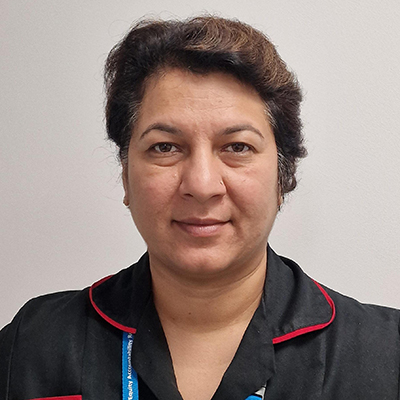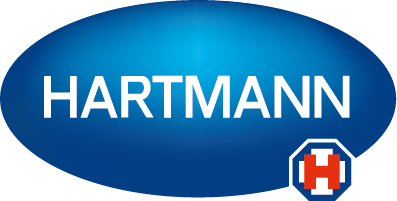Luxmi Dhoonmoon

Luxmi is a Nurse Consultant Tissue Viability working for London North West University Healthcare NHS trust. She completed her BSc (Tissue Viability Pathway) in 2010 and MSc Advanced Practice in 2013, from St Georges university of London. She is currently enrolled on PhD in Nursing studies with University of Nottingham, year 3. She is a Professional Nurse Advocate and Queen’s Nurse and is also a Visiting Lecturer at the University of Hertfordshire for MSc Skin integrity.
Luxmi is passionate about wound care and has a passion for all types of wounds. She introduced the Stop the Pressure campaign across her previous trust to reduce harm in their care homes and reduce safeguarding concerns with regards to PU. She also led a team of Tissue Viability Nurses and Nursing Assistants to deliver a seamless service across the community both for ambulant and housebound patients and also in care homes and mental health settings. She is now leading a team of specialist TV nurses in the acute setting with the aim of implementing best practice across the Trust.
She won the JWC award for Best Clinical research in 2015 for making a difference in patients with chronic wounds while using topical Oxygen therapy and contributed to several case studies, best practice statements and research to enhance clinical evidence forming the future of practice.
Luxmi has published several clinical evaluations on patient care and improvement and recently authored an article in Independent Nurse on Long Covid and self-care. She recently co-chaired a best practice document with Wounds UK to reflect assessment of dark skin tone in practice and Wounds International and has published several articles on skin tone and several aspects of wound care with the Wounds International and GPN.
Her aim is to currently develop her clinical research further to improve public health and address skin tone bias in wound care thus reducing inequity in wound care.
Presentation at The Society of Tissue Viability 2025 Conference
Necrotising fascitis – urgency and impact on patients
Objectives
The presentation is aimed at all healthcare professionals.
Delegates will learn about:
- Early recognition & diagnosis – Understanding the key clinical signs and risk factors to enable prompt identification of necrotising fasciitis
- Urgency of treatment – Recognising the critical importance of early surgical intervention and multidisciplinary management to improve survival rates
- Impact on patients – Gaining insight into the physical, psychological, and long-term consequences of necrotising fasciitis, including limb loss and rehabilitation needs
- Best practice & evidence-based management – Exploring current guidelines, treatment protocols, and emerging therapies to enhance patient outcomes
Abstract
Background: Necrotising fasciitis (NF) is a rare but life-threatening soft tissue infection characterized by rapid necrosis of the fascia and surrounding tissues. Often referred to as a “flesh-eating disease,” NF is caused by polymicrobial infections, with Group A Streptococcus (GAS) being a primary pathogen. Delayed diagnosis and treatment can lead to high morbidity and mortality, often requiring extensive surgical debridement, amputation, and intensive care management. The condition places a significant burden on both patients and healthcare systems due to its aggressive progression and complex treatment needs.
Methods used: Diagnosis relies on a combination of clinical assessment, laboratory markers (e.g., LRINEC score), imaging (CT/MRI), and microbiological confirmation. Treatment involves a multidisciplinary approach, including broad-spectrum intravenous antibiotics, surgical intervention, and intensive supportive care. Hyperbaric oxygen therapy and immunoglobulin therapy have been explored as adjunct treatments.
Summary/major findings: Early recognition and prompt intervention significantly improve patient outcomes. Studies highlight that delayed surgical debridement beyond 24 hours is associated with increased mortality. Factors such as diabetes, immunosuppression, and peripheral vascular disease contribute to increased susceptibility and poorer prognosis. Patient-centered care, including long-term rehabilitation and psychological support, is essential due to the lasting impact of NF, including limb loss, scarring, and post-traumatic stress.
Conclusion/key messages: Necrotising fasciitis is a surgical emergency requiring immediate intervention. Healthcare professionals must maintain a high index of suspicion for early diagnosis. Improved awareness, rapid response protocols, and patient education are crucial in reducing the devastating impact of NF on individuals and healthcare resources.
Presentation at The SoTV/EWMA 2024 Conference, London
Addressing skin tone bias in wound care
Learning objectives
After attending this session, persons will be able to:
- Understand the importance of being skin tone aware
- Be able to identify skin changes in different skin tones
- Be able to address the challenges of skin tone complexities
Abstract
Diversity across all our communities necessitates clinicians working in wound care to have knowledge and skills in the accurate assessment of signs and symptoms of skin and wound problems for people with darker skin tones. This session will present the current evidence base and clinical considerations related to tissue viability practice.














